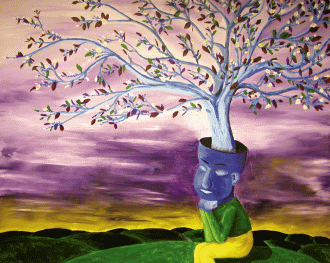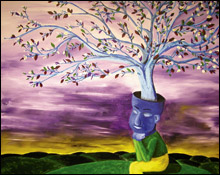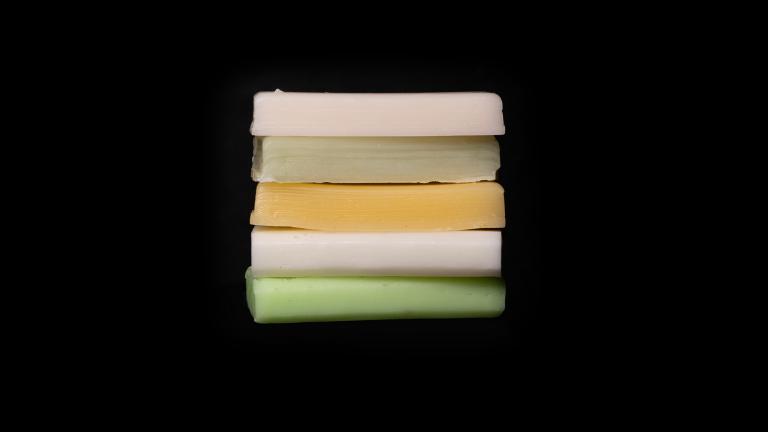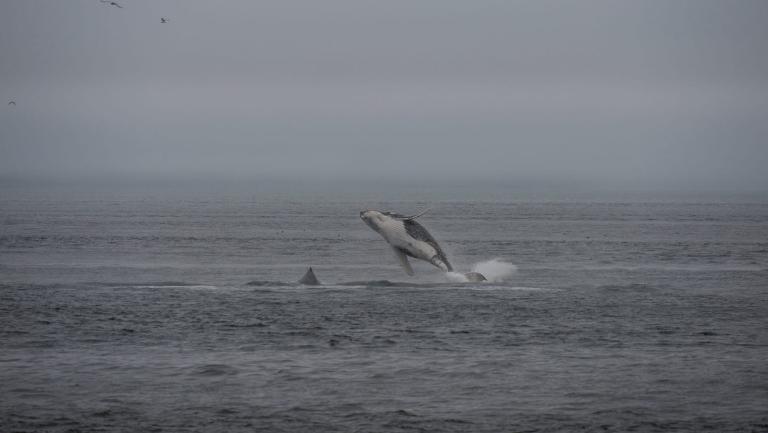
Shall I compare thee to climate change?
Here’s the paradox: If the scientists are right, we’re living through the biggest thing that’s happened since human civilization emerged. One species, ours, has by itself in the course of a couple of generations managed to powerfully raise the temperature of an entire planet, to knock its most basic systems out of kilter. But oddly, though we know about it, we don’t know about it. It hasn’t registered in our gut; it isn’t part of our culture. Where are the books? The poems? The plays? The goddamn operas? Compare it to, say, the horror of AIDS in the last two decades, which has produced a staggering outpouring of art that, in turn, has had real political effect. I mean, when people someday look back on our moment, the single most significant item will doubtless be the sudden spiking temperature. But they’ll have a hell of a time figuring out what it meant to us.
Why is that? Well, some of the reasons are obvious. It’s way too big, for one. When something is happening everywhere all at once, it threatens constantly to become backdrop, context, instead of event. And in this case, since the context is the natural world that more and more of us have forgotten how to read, the changes seem small. At my latitude, spring comes a week earlier than it did in 1970. The ice on the lake melts, and the snow in the fields; and the fields commence to drying out, which has real implications later in the season. That’s an almost inconceivably huge change in a basic physical system over a short stretch of time — but not quite big enough to be noticeable, unless you’re paying attention with, say, the vigilance of a farmer. In a society that has more prison inmates than farmers, that’s unlikely.
Conversely, when global warming does attempt to show its teeth, the immediate event is usually overdramatic, so vast that the event itself grabs all the attention, leaving none behind for the motive cause. Four hurricanes sweep across Florida in a summer, which is just the kind of result computer modeling says is becoming more likely. But who has time for computer modeling and carbon when there is Storm Surge and Blown-Over Mobile Home and Waiting in Line for Ice, all of which are a lot easier to take pictures of?
And the dramatis personae are deficient as well, being us. Too many villains can mar a plot as easily as too few, and “starring everyone with a car” is a large cast indeed. We don’t much want to be told that we’re the problem, primarily because it implies we would have to change some of our ways. In a consumer society, those habits constitute a large part of our identity, not to mention our net worth; once you’ve got your plasma screen installed in the rec room of the 3,500-square-foot house, this is an epic you can do without.
Especially since there’s no real chance of a happy ending. We can do better, or we can certainly do much worse — but we’ve already pushed the carbon concentration past the point where the atmosphere can easily heal itself. So far we’ve increased the world’s temperature about 1 degree F; the best guess is we’ve stoked the fires enough that another 2 degrees are essentially inevitable. Past that, what we do now matters deeply. But the difference between miserable and catastrophic is not a compelling dramatic device.
The two large-scale attempts to achieve mythic status for climate change thus far — the movie The Day After Tomorrow and Michael Crichton’s State of Fear — prove most of these rules. To dramatize the first story, the producers postulated a series of physically bizarre and silly events: global warming somehow leads to a kind of flash-freezing, with supercyclonic storms ripping chilled air from the stratosphere and forcing it down on midtown Manhattan. Oh, and watch out for the wolf escaped from the zoo. Crichton, meanwhile, postulates enviro-spawned tsunamis and cannibal kings in order to prove the whole thing a fable.
In the face of all this, how to proceed? If we can’t turn to creative artists, then to documentarians. Their impulse is to gather more evidence so that people will listen and do something; hence the photographers descending on Tuvalu to watch for rising waves and the writers heading north to interview the Inuit. It’s all remarkable stuff — the news that communities in the far north were hearing thunder for the first time in their histories shook me. But it’s also news about people who, almost by definition, are marginal to those of us in the developed world. The question is how to unsettle the audience.
The possibility exists, I think — in part because events get steadily more obvious. The Western European heatwave that killed tens of thousands in the summer of 2003 is a good example. Its toll was horrifying precisely because they were not Ghanaians or Bengalis, people who we have become used to blithely and guiltily reading about dying by the thousands. These were people who could easily have been us, with magazine subscriptions and cable TV and the expectation that nature was not going to do them in — that they’d progressed to a point where they were beyond nature’s real reach.
Not only that, but the deaths illustrated another crucial point. The breakdown in human community, the rise of a kind of hyperindividualism perfectly symbolized by the automobile, was both the motive and immediate cause of many of the fatalities. Old people baked to death in their apartments because the temperature got higher than it had ever gotten before (and barely cooled at night); and they baked to death in their apartments because the social structure that always protected each of us from such events had broken down. I mean, nobody was checking up on them. It’s hard to imagine more symbolic casualties, and easy to imagine the play, the novel, that should keep that fortnight near the front of our minds.
But what emotions should the playwright play with — fear? guilt? Sure, but not only those. For me, a kind of wistfulness has always been at the core of my reaction to global warming, a sense that as a species we’re finally and irrevocably managing to crowd out everything else, smudge our fingerprints on every frame of the book of life. There seems to me no more telling turn in our civilization, at least since the apple in Eden (a crisis that gave rise to more great art than anything in the Western tradition). But there also needs to be hope as well — visions of what it might feel like to live on a planet where somehow we use this moment as an opportunity to confront our consumer society, use it to begin the process of rebuilding community. They don’t have to be romantic visions, though a little romance wouldn’t hurt.
We are all actors in this drama, more of us at every moment. The great subplot of these few years involves the introduction of Indians and Chinese as principal players, a fascinating confrontation between old privilege and new assertion. It may well be that because no one stands outside the scene, no one has the distance to make art from it. But we’ve got to try. Art, like religion, is one of the ways we digest what is happening to us, make the sense out of it that proceeds to action. Otherwise, the only role left to us — noble, but also enraging in its impotence — is simply to pay witness. The world is never going to be, in human time, more intact than it is at this moment. Therefore it falls to those of us alive now to watch and record its flora, its fauna, its rains, its snow, its ice, its peoples. To document the buzzing, glorious, cruel, mysterious planet we were born onto, before in our carelessness we leave it far less sweet.
Time rushes on, in ways that humans have never before contemplated. That famous picture of the earth from outer space that Apollo beamed back in the late 1960s — already that’s not the world we inhabit; its poles are melting, its oceans rising. We can register what is happening with satellites and scientific instruments, but can we register it in our imaginations, the most sensitive of all our devices?



